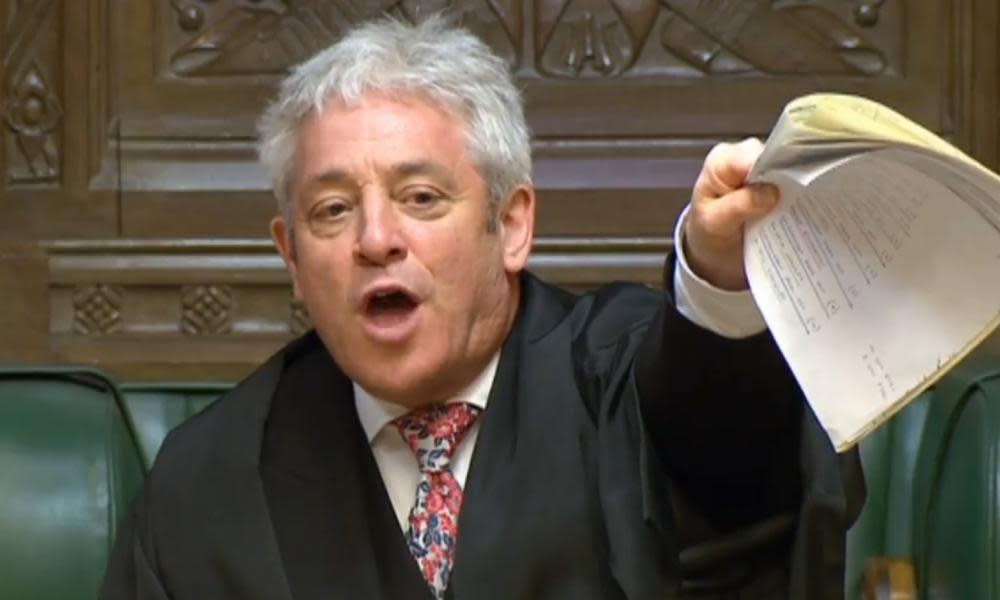MPs' anti-bullying rules will cover Speaker, Leadsom suggests

New rules to stop MPs from bullying and harassing staff will cover the office of the Speaker, meaning that any future complaints about John Bercow would have to be investigated, the leader of the Commons has suggested.
Andrea Leadsom said “absolutely everybody” would be covered by the new code of conduct for 15,000 people – including MPs, peers and staff – on the parliamentary estate, which will be debated on Thursday.
“Key to this is that there is justice and equality for everybody regardless of how senior or supposedly important they are, versus how junior or new to the place they are,” she said.
“Anybody who works in, with, or for parliament must be given the same access to an equal and fair system that gives them satisfaction of final closure of their complaint.”
Leadsom confirmed that the rules would not apply to behaviour dating from before the June 2017 general election, so historical complaints against the Speaker and other sitting MPs would remain outside their remit.
Complainants would, however, be able to record incidents from before 2017 under the new independent procedure. Leadsom admitted it was a “grey area” but confirmed that they could ask for their name to stay on file, in case further allegations were made against the same individuals in future.
“There is a tension between transparency and actually enabling culture change. The reality is that every complaint is logged,” she said.
The changes will also boost the power of the seven lay members of the Commons standards committee. The MPs on the committee blocked an investigation in May into allegations the Speaker bullied members of staff. Bercow has denied the bullying claims against him.
Leadsom insisted that the so-called indicative vote would be “obligatory and transparent” so that the public could see who had backed – or blocked – any further action. If MPs failed to abide by the result the government could legislate.
“It would be a very, very brave set of seven MPs who then decided that just because they didn’t get what they wanted, they would go off to have another one themselves,” she said.
She set out a tougher range of sanctions for those found to have behaved inappropriately, which could ultimately mean MPs losing their seats, peers being expelled, staff dismissed and contractors stripped of their passes.
But she added that her preference was for mediation so the individuals concerned could put incidents behind them. She said: “This was always about culture change, not taking people out and hanging and flogging them.”
Critics of the new system, who do not think it goes far enough, are concerned that perpetrators will be protected by anonymity. Leadsom argued that without confidentiality it would be difficult to protect those reporting abuse.
The current Respect policy, introduced in 2011, was a formal process for dealing with complaints by staff against MPs but was deemed inadequate by unions and MPs.
Under the new system, complaints would trigger a confidential inquiry by the parliamentary commissioner for standards. The government is confident it will get the backing of the Commons.
Dave Penman, general secretary of the FDA Union, the top civil servants union, called for the process to be delayed while concerns were addressed.
He said: “Andrea Leadsom’s proposals are being rushed through before recess and are yet to demonstrate that they will deliver on the promises made to victims of bullying and harassment in Parliament.
“There is still no independent decision-making on the most serious cases or appeals, meaning that MPs will continue to mark their own homework and the political parties will still retain an influence.
“Despite legal advice to the contrary, Leadsom’s proposals deny justice to anyone whose complaint was before 2017, providing a clean slate for the perpetrators of bullying and harassment. This decision to exclude past cases will be viewed by many as caving in to pressure from parties and MPs worried about a slew of accusations waiting to be investigated.”

 Yahoo News
Yahoo News 
